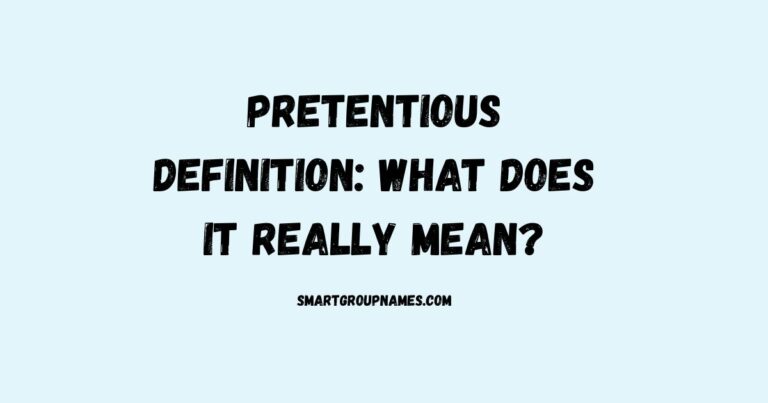Have you ever encountered someone who seemed to be trying too hard to impress others with their knowledge or sophistication? You might have instinctively labeled them as “pretentious,” but what does this word really mean? The pretentious definition goes beyond simple showing off—it encompasses a complex behavior pattern that many of us recognize but struggle to articulate effectively.
In today’s world, where social media and professional networking often encourage self-promotion, understanding the pretentious meaning becomes increasingly important. Whether you’re navigating workplace dynamics, social situations, or simply trying to improve your communication skills, knowing how to identify and address pretentious behavior can make you a more effective communicator.
This comprehensive guide will explore the complete pretentious definition, examine its origins, and provide you with practical alternatives that can help you communicate more thoughtfully and diplomatically.
What Does Pretentious Mean? The Complete Definition
To define pretentious, we must understand its core essence: pretentious refers to someone who attempts to impress others by pretending to have greater importance, talent, culture, or knowledge than they actually possess. This behavior is typically characterized by:
- Inauthentic displays of knowledge or sophistication
- Excessive showing off of vocabulary, cultural references, or achievements
- Overly complex communication when simple language would suffice
- Artificial elevation of one’s social or intellectual status
The pretentious meaning carries a distinctly negative connotation, suggesting that the person’s behavior is not only inauthentic but also potentially irritating to others. When someone is described as pretentious, it implies they’re more interested in appearing impressive than in genuine communication or connection.
Real-World Example of Pretentious Behavior
Consider this scenario: “His review of the film was so pretentious, it felt like he was more interested in showing off his vocabulary than discussing the actual movie.” This example perfectly illustrates the pretentious definition in action—the reviewer prioritized appearing intellectual over providing useful insights.
Etymology and Historical Context of “Pretentious”
Understanding the pretentious meaning becomes richer when we explore its linguistic roots. The word “pretentious” derives from the Latin word praetendere, which means “to stretch forth” or “to claim.” This etymology reveals the fundamental nature of pretentious behavior: it’s about making exaggerated claims about oneself.
Over centuries, the term evolved to describe people who make inflated assertions about their:
- Intelligence and knowledge
- Cultural sophistication
- Social status
- Creative abilities
- Professional expertise
This historical development shows that pretentious behavior isn’t a modern phenomenon—humans have always been tempted to embellish their capabilities to impress others.
Common Situations Where “Pretentious” Is Used
To fully grasp the pretentious definition, it’s helpful to recognize the contexts where this label typically applies:
1. Academic and Intellectual Discussions
When someone uses unnecessarily complex terminology or references obscure concepts to appear more knowledgeable than they are.
2. Art and Cultural Commentary
Critics or enthusiasts who prioritize sounding sophisticated over providing accessible insights about movies, books, music, or visual arts.
3. Social Media and Online Presence
Individuals who craft posts designed more to impress followers than to share genuine thoughts or experiences.
4. Professional Settings
Colleagues who use jargon, name-dropping, or overly formal language to establish superiority rather than communicate effectively.
5. Social Gatherings
People who dominate conversations with stories or knowledge intended to showcase their worldliness or intelligence.
Why “Pretentious” Can Be Problematic in Communication
While the pretentious meaning is generally well-understood, using this label can create communication challenges:
The Harshness Factor
Calling someone pretentious often comes across as a personal attack rather than constructive feedback. It can shut down dialogue and create defensiveness.
Subjectivity Issues
What seems pretentious to one person might be genuine enthusiasm or expertise to another. Cultural backgrounds, education levels, and personal experiences all influence these perceptions.
Potential for Misunderstanding
Sometimes people appear pretentious when they’re actually:
- Nervous and overcompensating
- Passionate about their subject matter
- From different cultural or educational backgrounds
- Trying to meet perceived expectations
15 Thoughtful Alternatives to “Pretentious”
Instead of using the potentially harsh label “pretentious,” consider these more nuanced alternatives that can improve your communication:
1. Overly Formal
When to use: Someone uses unnecessarily complex or stiff language Example: “His presentation felt a bit overly formal for our team meeting.”
2. Trying Too Hard
When to use: You want to be honest without being insulting Example: “The restaurant’s décor seemed to be trying a bit too hard to be trendy.”
3. Affected
When to use: Describing behavior that seems artificial or forced Example: “Her accent came across as affected during the interview.”
4. Elitist
When to use: Someone separates themselves based on taste or intellect Example: “His comments about mainstream music seemed somewhat elitist.”
5. Grandiose
When to use: Describing exaggerated style or ideas Example: “The proposal was innovative, but the presentation felt a bit grandiose.”
6. Inauthentic
When to use: Suggesting someone isn’t being true to themselves Example: “The speech was well-written, but the delivery felt inauthentic.”
7. Exaggerated
When to use: Describing over-the-top actions or expressions Example: “The emotion in her performance seemed slightly exaggerated.”
8. Self-Important
When to use: Someone treats their opinions as superior Example: “The artist’s statement came across as a bit self-important.”
9. Showy
When to use: Someone is flaunting style, wealth, or intellect Example: “The dinner presentation felt more showy than sincere.”
10. Trying to Impress
When to use: Someone is making an obvious effort to impress Example: “It seemed like he was trying to impress the client with technical jargon.”
11. Too Polished
When to use: Something is too rehearsed or manufactured Example: “The candidate’s answers were almost too polished to feel genuine.”
12. Theatrical
When to use: Someone’s mannerisms are overly dramatic Example: “His gestures were so theatrical they overshadowed his message.”
13. Overwrought
When to use: Emotions or words are overused or too intense Example: “The essay was compelling but sometimes overwrought.”
14. Contrived
When to use: Something feels overly structured or unnatural Example: “The conversation felt contrived rather than spontaneous.”
15. Highfalutin
When to use: Someone uses fancy or snobbish language (informal) Example: “That’s a lot of highfalutin language just to say you enjoyed the book.”
How to Recognize Pretentious Behavior
Understanding the pretentious definition helps you identify these behaviors in various contexts:
Verbal Indicators
- Using unnecessarily complex vocabulary
- Name-dropping famous people, places, or concepts
- Speaking in an artificial accent or overly formal tone
- Making obscure references without explanation
Non-Verbal Signs
- Exaggerated gestures or expressions
- Inappropriate formality in dress or manner
- Dismissive body language toward others
- Obvious attempts to attract attention
Contextual Clues
- Responses that don’t match the situation’s formality
- Information shared primarily to impress rather than inform
- Consistent pattern of one-upmanship in conversations
- Difficulty engaging in simple, straightforward communication
The Psychology Behind Pretentious Behavior
To truly understand the pretentious meaning, we should consider the psychological motivations:
Insecurity and Overcompensation
Many pretentious behaviors stem from deep-seated insecurity. People may feel inadequate and compensate by trying to appear more knowledgeable or sophisticated than they are.
Social Anxiety
Some individuals become pretentious when they’re nervous, defaulting to formal or complex language as a defense mechanism.
Learned Behavior
Growing up in environments where intellectual display was valued over genuine communication can lead to pretentious habits.
Perfectionism
The desire to appear flawless can drive people to present an artificial, overly polished version of themselves.
Practical Tips for Avoiding Pretentious Communication
Now that you understand the pretentious definition, here are strategies to ensure your communication remains authentic:
1. Match Your Audience
Adjust your language and examples to suit your listeners’ background and interests.
2. Prioritize Clarity
Choose simple, clear language over complex terminology whenever possible.
3. Stay Genuine
Share knowledge and experiences because they’re relevant, not because they make you look impressive.
4. Listen Actively
Focus on understanding others rather than planning your next impressive contribution.
5. Embrace Vulnerability
It’s okay to admit when you don’t know something or when you’re learning.
When “Pretentious” Might Be Unfair
Sometimes the label “pretentious” is applied unfairly to people who are:
Genuinely Knowledgeable
Experts in their field might seem pretentious when they’re simply sharing their expertise.
Culturally Different
People from different backgrounds might have communication styles that seem pretentious but are actually normal in their context.
Passionate and Enthusiastic
Someone’s genuine excitement about a topic might be mistaken for showing off.
Professionally Required
Certain professions or situations demand formal language that might seem pretentious in other contexts.
The Impact of Digital Communication on Pretentious Behavior
Modern technology has created new platforms for pretentious behavior:
Social Media Pretension
- Carefully curated posts designed to impress
- Humble-bragging disguised as sharing
- Using platforms to showcase knowledge or experiences
Professional Networking
- LinkedIn posts that prioritize appearance over substance
- Email communication that’s unnecessarily formal
- Virtual meeting behavior designed to impress rather than contribute
Online Learning and Discussion
- Forum posts that show off knowledge rather than help others
- Comment sections where people compete to appear most informed
- Online courses where students try to impress instructors rather than learn
Cultural Variations in Pretentious Behavior
The pretentious meaning can vary significantly across cultures:
High-Context Cultures
In some societies, formal language and elaborate expressions are signs of respect, not pretension.
Educational Traditions
Academic cultures in different countries have varying expectations for how knowledge should be shared and displayed.
Social Hierarchies
Some cultures have more rigid social structures where formal communication is expected and necessary.
Regional Differences
Even within the same country, regional differences in communication styles can lead to misunderstandings about pretentious behavior.
Building Better Communication Skills
Understanding the pretentious definition is just the first step. Here’s how to develop more effective communication:
Practice Active Listening
Focus on understanding others’ perspectives rather than planning your response.
Develop Emotional Intelligence
Learn to read social cues and adjust your communication style accordingly.
Seek Feedback
Ask trusted friends or colleagues if your communication style is effective and authentic.
Embrace Continuous Learning
Stay curious and open to new ideas without feeling the need to prove your existing knowledge.
Value Connection Over Impression
Prioritize building genuine relationships over appearing impressive.
Conclusion: Mastering the Art of Authentic Communication
The pretentious definition encompasses more than simple showing off—it represents a fundamental disconnect between authentic communication and performative behavior. By understanding the pretentious meaning and learning to recognize these patterns, you can become a more effective and empathetic communicator.
Remember that calling someone pretentious is often less productive than addressing the specific behavior or choosing one of the more nuanced alternatives we’ve discussed. Whether someone appears overly formal, affected, or trying too hard, approaching these situations with understanding and diplomatic language will lead to better outcomes.
The goal isn’t to eliminate all formality or sophistication from communication, but rather to ensure that our words and actions serve genuine connection and understanding rather than mere impression-management. When we define pretentious behavior clearly, we can work toward more authentic, effective communication in all areas of our lives.
By incorporating these insights into your daily interactions, you’ll find that your communication becomes more genuine, your relationships deepen, and your ability to navigate complex social situations improves dramatically. The key is balancing knowledge sharing with humility, expertise with accessibility, and confidence with authenticity.
Read Also: Clan Names for COD

JCK Smith is a seasoned writer specializing in the names niche, helping individuals and businesses find the perfect names for groups, teams, brands, and more. With years of experience in creative naming, JCK blends originality with strategic SEO to craft lists that rank high on search engines and provide real value to users.











